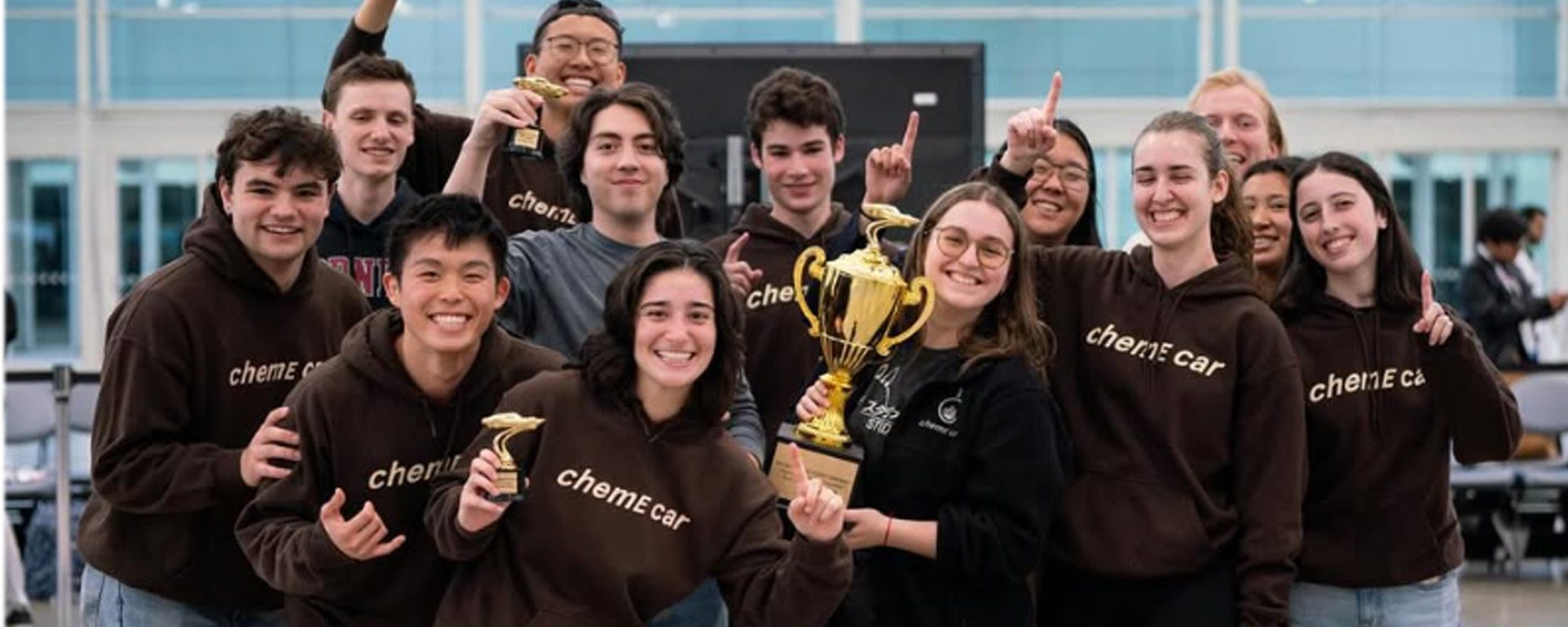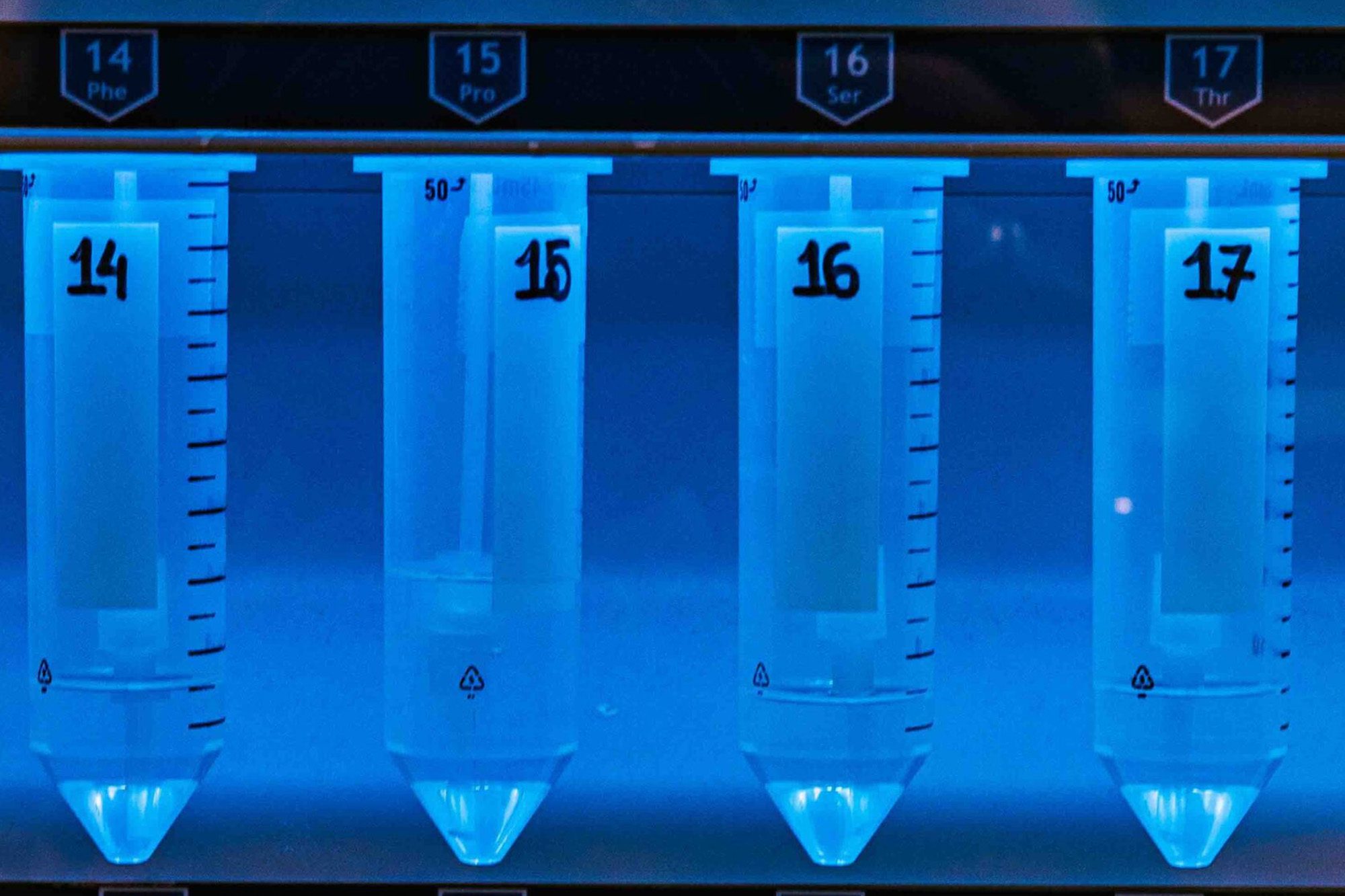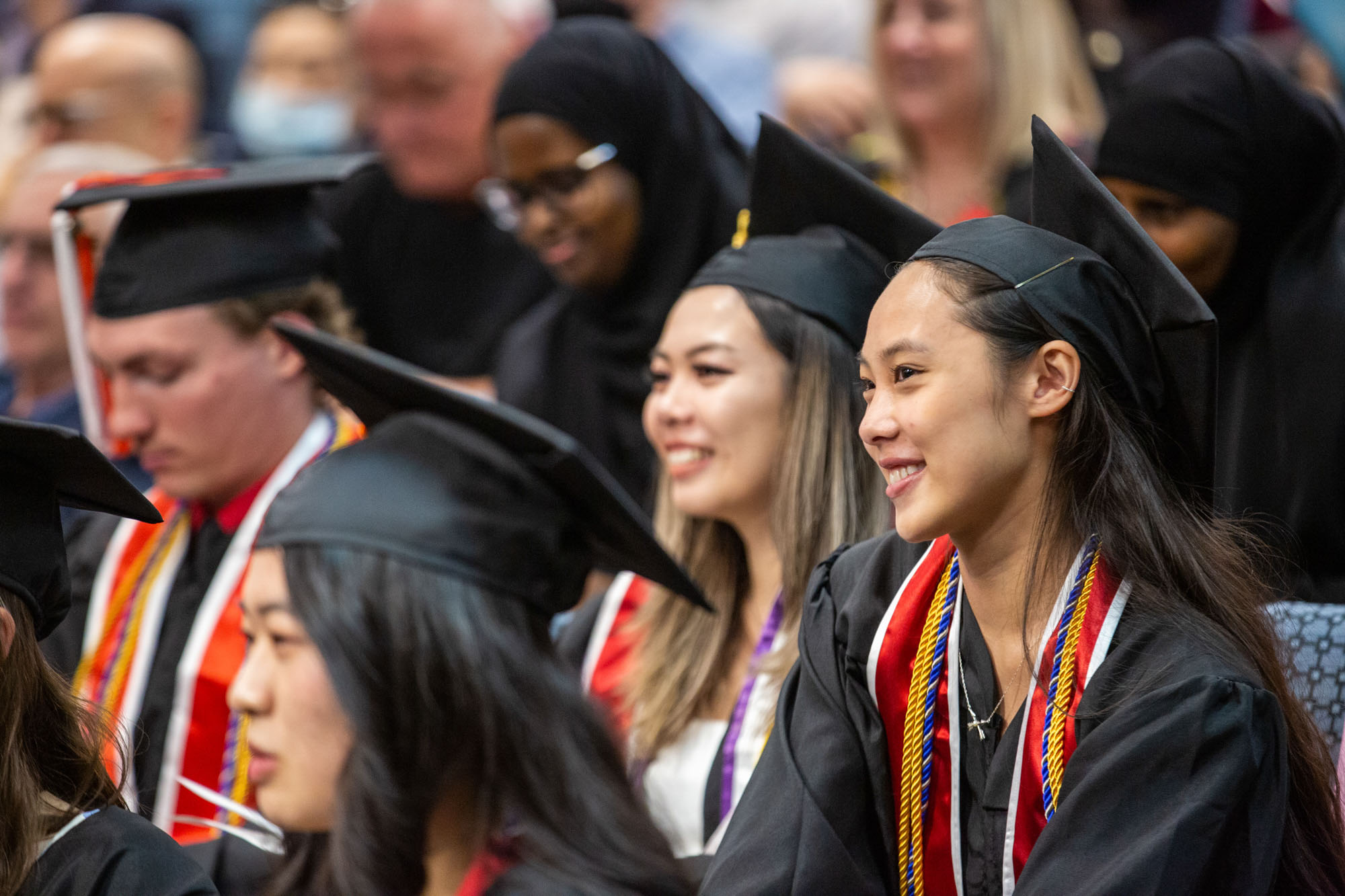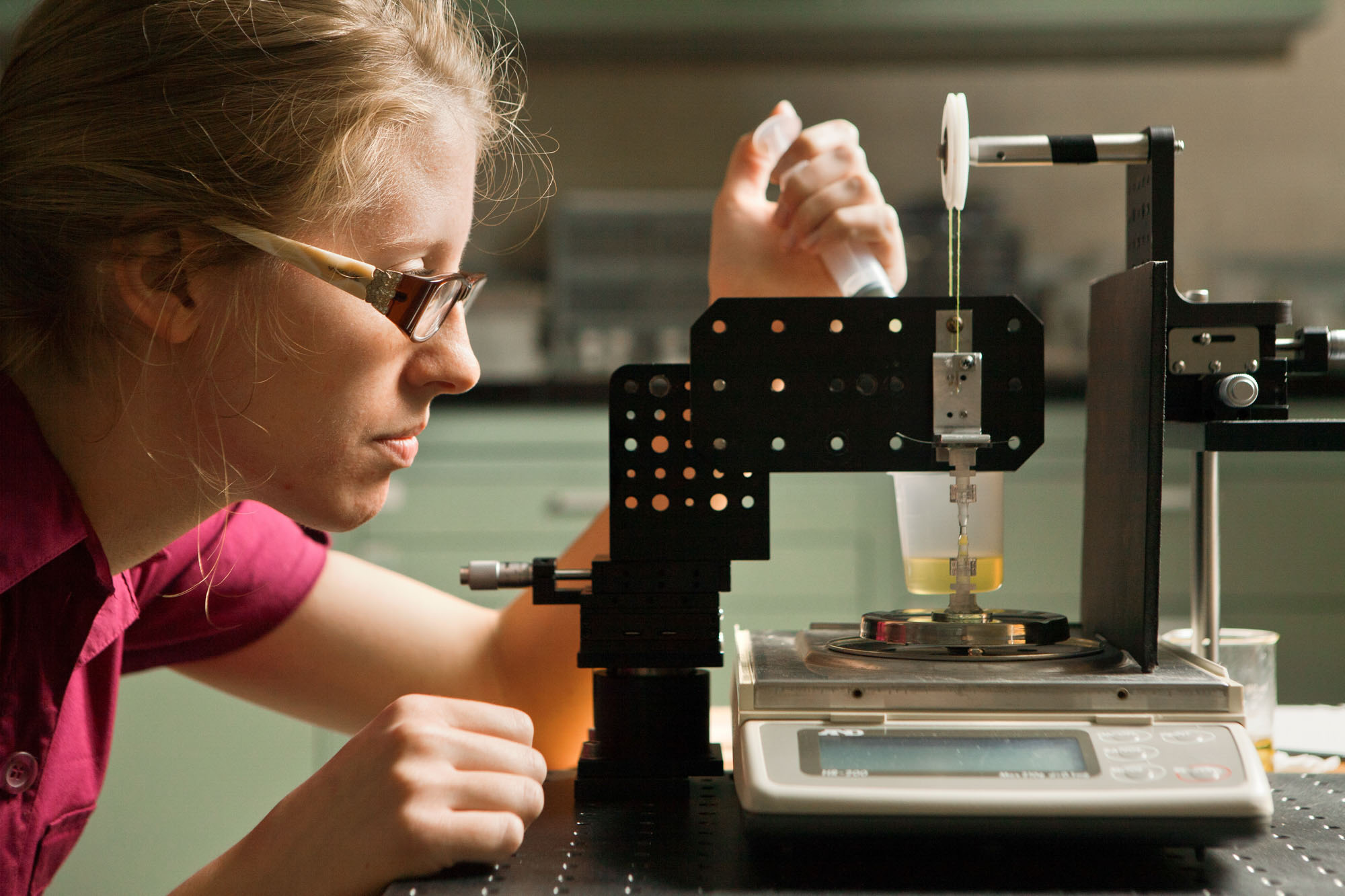Specialized Knowledge and Practical Experience
Our bachelor of science (B.S.) degree prepares you with skills to develop products that can change people’s lives. Explore Cornell’s courses of study to tailor your courses to match your career goals or personal interests and plan ahead if you wish to customize your degree by choosing electives around a focus area.
Curriculum
By design, our B.S. curriculum supports career discovery and development, ethical decision-making and building leadership and communication skills. You’ll also learn research and laboratory best practices, which are essential for graduates entering the workforce or pursuing higher-level degrees.
Connecting curriculum to future careers in industry, graduate studies, or research is an essential part of the R.F. Smith School experience. We’re continuously making improvements to curriculum and classroom instruction to prepare students for success in chemical engineering fields.
Courses
We require more chemistry than other engineering programs and recommend you take required chemistry courses early, even if you are unsure of whether you will major in chemical engineering. Review our affiliation criteria ahead of time so you know that your academic plan is on the right track. While not required, undergraduates can choose to structure their elective courses around a degree focus or a minor.
Review the chemical engineering major degree requirements and the most recent version of the Cornell Engineering Undergraduate Handbook at the following pages for specific information on course requirements and the typical course flow chart for chemical and biomolecular engineering majors.
Typical Course Sequence
This sequence would be typical for a student who is not entering with any AP credits. Some courses may be eligible for substitution, especially in the areas of physics, organic chemistry, and computing.
Freshman Year
| Fall (14 credits) | Spring (19 credits) |
|---|---|
| MATH 1910 – Calculus for Engineers (4) | MATH 1920 – Multivariable Calculus for Engineers (4) |
| CHEM 2090 – Engineering General Chemistry (4) | PHYS 1112 – Physics I: Mechanics & Heat (4) |
| ENGRI/CHEME 1120 – Introduction to Chemical Engineering (3) | CHEM 2080 – General Chemistry II (4) |
| Freshman Writing Seminar (3) | CS 1112 – Introduction to Computing Using MATLAB |
| Freshman Writing Seminar (3) |
Sophomore Year
| Fall (18 credits) | Spring (19 credits) |
|---|---|
| MATH 2930 – Differential Equations for Engineers (4) | CHEME 3230 – Fluid Mechanics (3) |
| PHYS 2213 – Physics II: Electromagnetism (4) | MATH 2940- Linear Algebra for Engineers (4) |
| ENGRD/CHEME 2190 – Mass and Energy Balances (3) | CHEM 3900 – Honors Physical Chemistry II (4) |
| CHEM 3890 – Honors Physical Chemistry I (4) | Biology elective* (3) |
| Liberal studies distribution (3) | Liberal studies distribution (3) |
- A score of 5 on the CEEB AP Examination in Biology or a score of 7 on the IB Higher Level exam
- CHEME 2880 – Biomolecular Engineering
- CHEME 5430 – Bioprocess Engineering
- Eight credits of pre-med biology sequence
- BIOG 1500, BIOG 1440, and BIOMG 1350 or
- BIOG 1107, 1108, and 1500
- BIOMI 2900 – General Microbiology Lectures
- BIOMG 3300 – Principles of Biochemistry, Individual Instruction (academic year) or
- BIOMG 3330 – Principles of Biochemistry (summer) or
- BIOMG 3350 – Principles of Biochemistry (spring)
- BIOMG 3310 – Principles of Biochemistry: Proteins and Metabolism and
BIOMG 3320 – Principles of Biochemistry: Molecular Biology
Junior Year
| Fall (14 credits) | Spring (15 credits) |
|---|---|
| CHEME 3130 – Chemical Engineering Thermodynamics (3) | CHEME 3010 – Career Perspectives (1) |
| CHEME 3240 – Heat and Mass Transfer (3) | CHEME 3320 – Analysis of Separation Processes (3) |
| CHEM 3570 – Organic Chemistry for the Life Sciences (3) | CHEME 3720 – Introduction to Process Dynamics and Control (2) |
| CHEM 2510 – Introduction to Experimental Organic Chemistry (2) | CHEME 3900 – Chemical Kinetics and Reactor Design (3) |
| Liberal studies distribution (3) | Major-approved elective** (3) |
| Liberal studies distribution (3) |
Senior Year
| Fall (18 credits) | Spring (14 credits) |
|---|---|
| CHEME 4320 – Chemical Engineering Laboratory (6) | CHEME 4620 – Chemical Process Design (5) |
| Advanced CHEME elective*** (3) | Advanced CHEME elective*** (3) |
| Major-approved elective ** (3) | Liberal studies distribution (3) |
| Major-approved elective** (3) | Approved elective (3) |
| Liberal studies distribution (3) |
***These courses must be satisfied by CHEME 4010, 4020, 4130, 4610, 4630, 4700, 4810, 4840, 5430, 5440, 5640, 5720, 6240, 6310, 6400, 6440, 6560, 6610, 6640, 6650, 6660, or 6800. In addition, three of the six one-credit modules associated with CHEME 6660 (CHEME 6661–6679), may be combined to satisfy one Advanced Chemical Engineering Elective..
Career-Integrated Courses
Career discovery and soft skills round out our technical curriculum to reflect changing industry and career trends and aspirations of our students. You’ll hear from, meet, and network with visiting chemical and biomolecular engineers who discuss their career paths and current jobs.
-
Industrial Practitioner Program
For over 25 years our industrial practitioner program connects industry expertise to the classroom to connect students with professionals, companies, and ideas. These chemical engineering professionals teach, mentor, and contribute to developing a curriculum that reflects the current industry state. They improve classroom instruction and create specializations like energy economics and data analytics.
-
Experiential Courses
Led by industrial practitioners, short-term experiential courses are a great way to see chemical and biomolecular engineering come to life in the field. These courses (typically worth two credits) are offered on an as-available basis, usually a week or so long, and bring students together with real companies for hands-on learning.
-
Capstone Design Course
In your last semester, you are challenged to put your coursework and experience into action with a semester-long team project to prepare you for work in an academic or corporate environment. This final design course introduces real chemical engineering challenges. You will work in a teams on project management, giving and receiving feedback, presenting, and communicating with industry representatives.
-
Internships and Co-ops
Complete a summer internship (12 weeks) or longer co-op (28 weeks) experience to prepare for full-time careers or graduate school. Work with your advisor or undergraduate coordinator to talk about these options. The Engineering Career Center has several job and internship resources available, too.
Community
We’re proud of our culture of collaboration and cooperation. Class sizes are relatively small (around 65 students), so you’ll get to know your peers, faculty and staff and these bonds last well beyond graduation. There are many opportunities to build community throughout the year, and alumni continue to be active participants, returning often for recruitment events, homecoming and reunion.
Minors
Many of our students seek additional experiences and training to meet their educational and career goals, such as preparation for medical school. You may choose a minor to strategically complement your engineering training and broaden your post-graduate career choices.
Completion of the minor is audited by the department or school that offers it. Work closely with your advisor to ensure your schedule allows for courses related to your minor and be aware of potential overlaps. Completing the required courses for your major should be your highest priority.
Careers
Chemical engineers are trailblazers who continuously apply research insights to produce goods, processes and systems. As a R.F. Smith School graduate, you’ll be among a group of engineers committed to solving some of the world’s most pressing challenges from producing textiles and plastics to developing methods for pharmaceutical products.
-
![A line of illuminated liquid-filled tubes for biomolecular testing lined up in a fume hood.]()
Industry
Traditional or emerging areas of biotechnology.
-
![a group of students in cap and gown smiling at commencement]()
Graduate Degree
M.Eng., M.S., or Ph.D.
-
![Student working on an experiment in a chemical and biomolecular engineering lab]()
Reseach
Gain high-level expertise in a specific research area or focus.
How to Affiliate
All admitted Cornell Engineering students start without a declared major to explore options. They take core math and science courses, engineering distribution courses, and writing seminars before choosing a major in their third semester (fall of sophomore year).
-
Advisors
If your current advisor isn’t part of the R.F. Smith School, you will be assigned a school faculty advisor when you affiliate. Your advisor will be listed on your approved affiliation form and their contact information will be emailed to you in January or June of your sophomore year.
-
Ready to Affiliate?
Cornell freshmen and sophomores interested in affiliating with chemical and biomolecular engineering should contact the undergraduate coordinator.
Undergraduate Program Contact
-
Undergraduate Program Coordinator
Carol Casler
Olin Hall, Room 158B
607-255-1489
cad1@cornell.edu



